2024年中考复习常用考点课件(共35张PPT)
文档属性
| 名称 | 2024年中考复习常用考点课件(共35张PPT) |  | |
| 格式 | pptx | ||
| 文件大小 | 46.7MB | ||
| 资源类型 | 教案 | ||
| 版本资源 | 通用版 | ||
| 科目 | 英语 | ||
| 更新时间 | 2024-06-13 06:41:04 | ||
图片预览



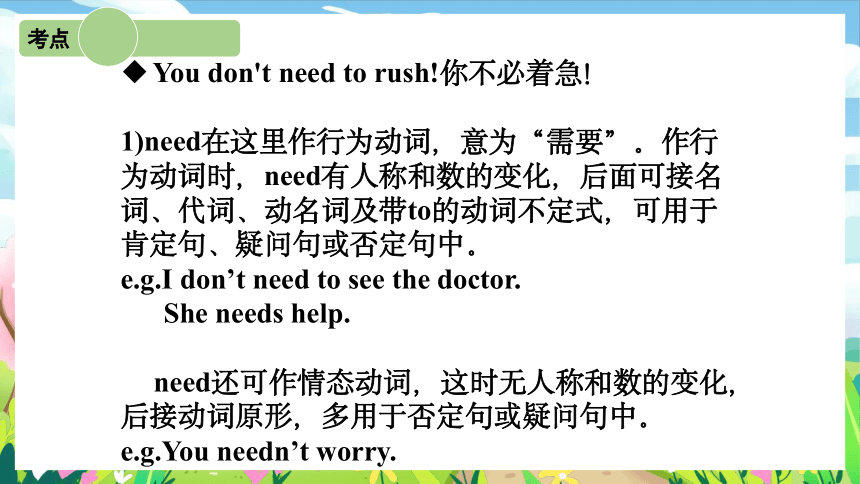
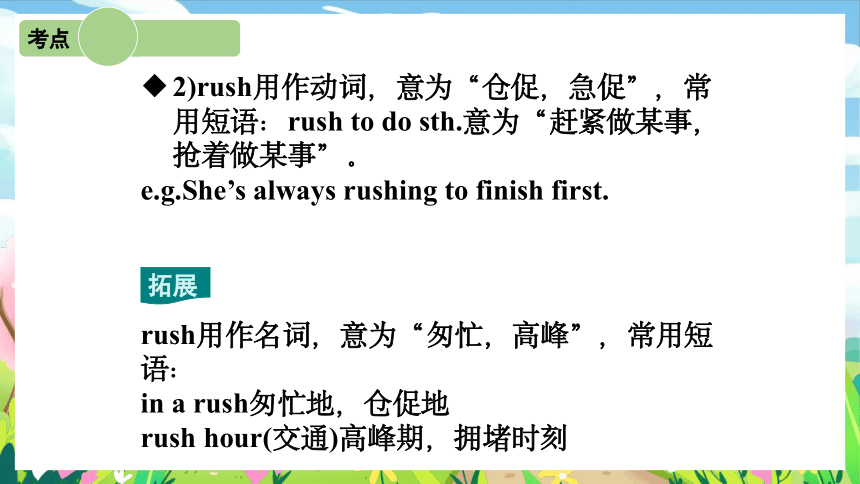
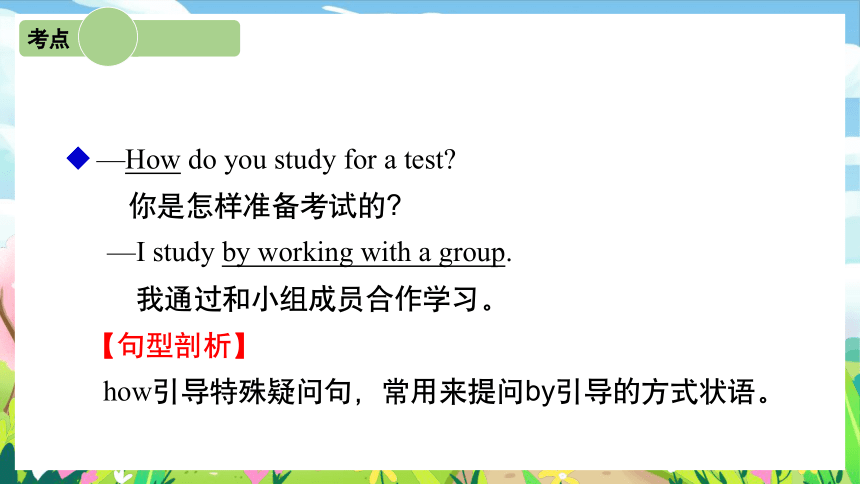
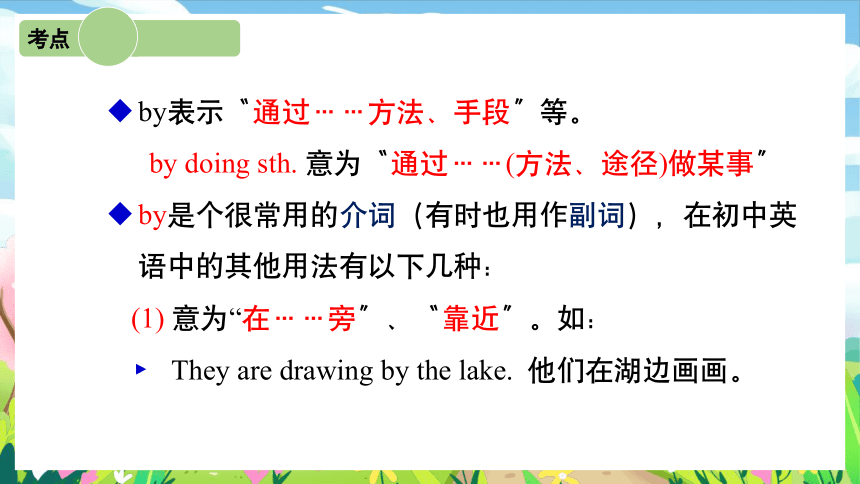
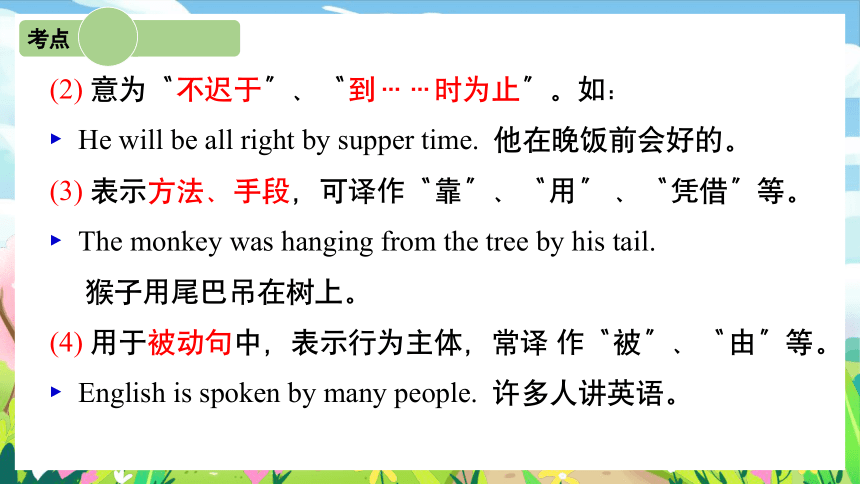
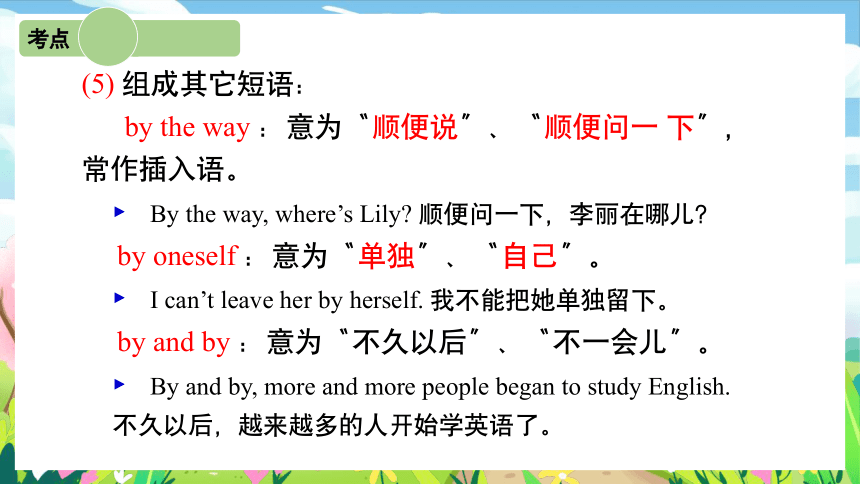

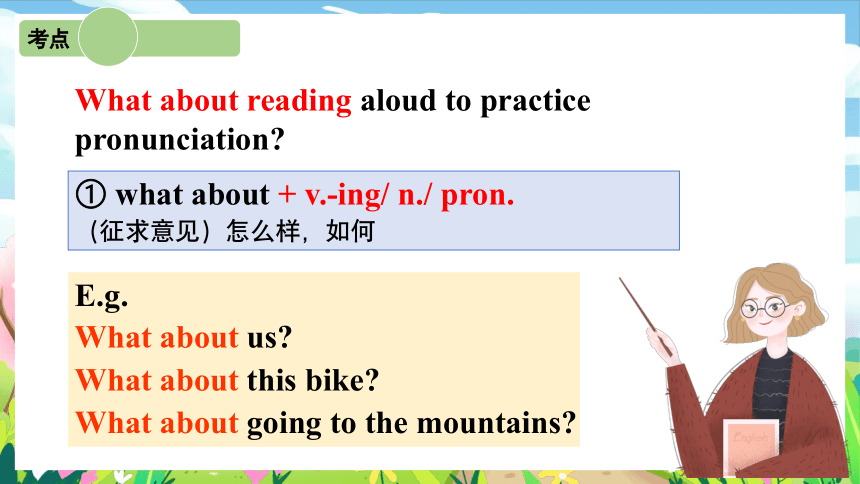
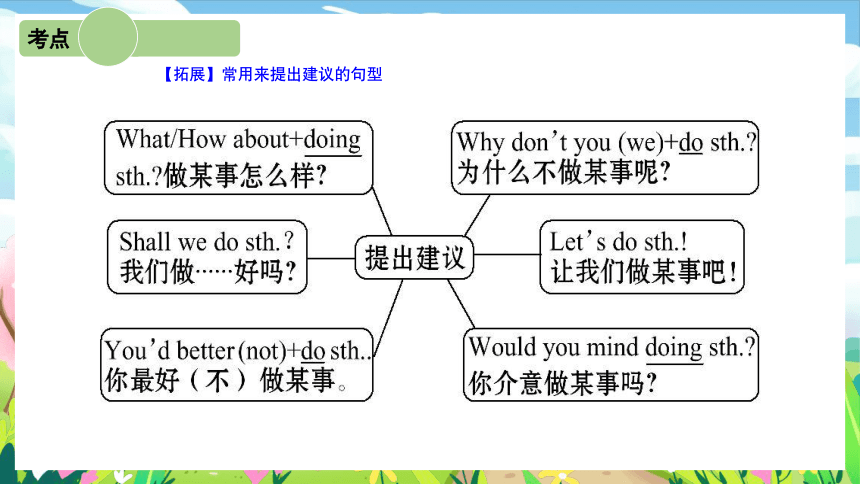
文档简介
(共35张PPT)
中考英语一轮复习
常用考点
知识梳理
01
Could you tell me how to get to Center Street
1) “疑问词+动词不定式”充当宾语。
e.g. Do you know how to solve the problem
你知道如何解决这个问题吗?
2) “疑问词+动词不定式”可以转化为宾语从句。
e.g. Could you tell me how I can get to Center
Street
Do you know how I can solve the problem
考点 tell
You don't need to rush!你不必着急!
1)need在这里作行为动词,意为“需要”。作行为动词时,need有人称和数的变化,后面可接名词、代词、动名词及带to的动词不定式,可用于肯定句、疑问句或否定句中。
e.g.I don’t need to see the doctor.
She needs help.
need还可作情态动词,这时无人称和数的变化,后接动词原形,多用于否定句或疑问句中。
e.g.You needn’t worry.
考点 tell
2)rush用作动词,意为“仓促,急促”,常用短语:rush to do sth.意为“赶紧做某事,抢着做某事”。
e.g.She’s always rushing to finish first.
拓展
rush用作名词,意为“匆忙,高峰”,常用短语:
in a rush匆忙地,仓促地
rush hour(交通)高峰期,拥堵时刻
考点 tell
—How do you study for a test
你是怎样准备考试的
—I study by working with a group.
我通过和小组成员合作学习。
【句型剖析】
how引导特殊疑问句,常用来提问by引导的方式状语。
考点 tell
by表示“通过……方法、手段”等。
by doing sth. 意为“通过……(方法、途径)做某事”
by是个很常用的介词(有时也用作副词),在初中英语中的其他用法有以下几种:
(1) 意为“在……旁”、“靠近”。如:
They are drawing by the lake. 他们在湖边画画。
考点 tell
(2) 意为“不迟于”、“到……时为止”。如:
He will be all right by supper time. 他在晚饭前会好的。
(3) 表示方法、手段,可译作“靠”、“用” 、“凭借”等。
The monkey was hanging from the tree by his tail.
猴子用尾巴吊在树上。
(4) 用于被动句中,表示行为主体,常译 作“被”、“由”等。
English is spoken by many people. 许多人讲英语。
考点 tell
(5) 组成其它短语:
by the way :意为“顺便说”、“顺便问一 下”, 常作插入语。
By the way, where’s Lily 顺便问一下,李丽在哪儿?
by oneself :意为“单独”、“自己”。
I can’t leave her by herself. 我不能把她单独留下。
by and by :意为“不久以后”、“不一会儿”。
By and by, more and more people began to study English.
不久以后,越来越多的人开始学英语了。
考点 tell
1. by可表示位置, 。也有“从……旁边(经过)”之意。
2. by可表示交通、传递等的方式。
3. by可表示时间,“到(某时)之前; 不迟于”。
4. by可用于构成 “被, 由”。
5. by可表示方式或手段, 结构在句中作方式
状语,“通过……方式(方法)”或“借助……手段”。
在……旁边
被动语态
by +v.-ing形式
考点 tell
What about reading aloud to practice pronunciation
① what about + v.-ing/ n./ pron.
(征求意见)怎么样,如何
E.g.
What about us
What about this bike
What about going to the mountains
考点 tell
【拓展】常用来提出建议的句型
考点 tell
词组短语:
read aloud 大声朗读 call / cry aloud 大声喊叫
speak / talk loudlyloudly 大声地说话 laugh loudly 大笑
例句:
Don’t talk so loudly in the public. 不要再公共场合大声讲话。
He read the letter aloud to us. 他把信大声念给我们听。
辨析副词 aloud 与 loudly
aloud 强调“大声地、出声地”( 放在动词后面);
loudly 强调声音喧哗和吵闹,“响亮地”( 放在动词前后均可)
考点 tell
It’s too hard to understand spoken English.
听懂英语口语太难了。
it是形式主语, 不定式短语to understand spoken English是真正的主语。该句句型为:
It’s + adj. + (for sb.) + to do sth.
(对某人来说)做某事是……的
e.g. It’s too easy for her to answer the question.
对她来说回答这个问题太容易了。
考点 tell
【链接】
too ... to ...结构常表示“太……以致于不能……”, too后接形容词或副词, to后接动词原形。
e.g. The room is too dirty to live in.
这个房间太脏了不能住。
He walks too slowly to get there on time.
他走得太慢了而不能及时到那儿。
考点 tell
...you can do this well depends on your learning habits.
短语词组:depend on/ upon 依据;依赖
depend on sb./ sth. to do sth.
e.g.
We depend entirely on donations from the public. 我们完全依赖公众的捐助。
I’m depending on you to get this done.
我指望着你把这件事给办了。
考点 tell
... successful learners have some good habits in common.
have sth. in common (with sb./ sth.)(与某人、某物有相同之处)
e.g.
Their methods have a lot in common.
他们的方法有很多相同之处。
考点 tell
Studies show that if you are interested in something, your brain is more active and it is also easier for you to pay attention to it for a long time.
【高频考点】
be interested in sth./ doing sth. 对...感兴趣的;关心的
(1) –ed : 修饰人,描述人的声音、表情或感受;
(2) –ing :修饰事物,描述事物的状态或性质。
考点 tell
【类似形容词】
① interested 感兴趣的
interesting 令人感兴趣的
② disappointed 失望的
disappointing 令人失望的
③ bored 感到无聊的
boring 无聊的
④ excited 兴奋的 ⑤relaxed 放松的
exciting 令人兴奋的 relaxing令人放松的
考点 tell
pay (much) attention to 注意;专心;留心
pay no attention to 对(某人的话语)不在意
e.g.
The TV was on but he wasn’t paying much attention to it. 电视开着,可是他没怎么注意看。
You should pay no attention to his stupid words. 别太在意他的蠢话。
考点 tell
My pronunciation improved as well by listening to the conversations in English movies.
通过听英语电影中的对话,我的发音提高了很多。
eg: Children in this country have a big zoo as well.
as well 也,和,多用于口语,通常用于句末。
链接
这个国家的孩子们也拥有一个很大的动物园。
I can understand my American friend as well.
我也能听懂我的美国朋友说什么了。
考点 tell
辨析:as well, also, too 与either
as well 多用于口语,位于句末,前面不加逗号。
also 位于句中be 动词、助动词和情态动词之后,行为动词之前。
too 位于肯定句句末,前面常加逗号。
either 位于否定句句末,前面常加逗号。
考点 tell
I often make mistakes in grammar.
mistake n. 错误;过失 make mistakes 犯错
Tom didn’t make a single spelling mistake in his composition.
汤姆在这篇作文里一个字也没拼错。
mistake vt. 弄错,误解
I mistook the number and went to the wrong room.
我记错号码, 走错了房间。
考点 tell
challenge n. 挑战
He wants a career that offers a challenge.
他想要一份有挑战性的事业。
vt. 向……挑战;对……提出异议
I challenged him to show his proof. 我要他拿出证据。
He challenged my view on that matter.
他就我对那件事的看法提出异议。
考点 tell
solution n. (问题、疑难等的) 解决;解答
It may take a long time to find a solution to the problem.
也许要花很长时间才能找到解决这个问题的办法。 The solution of the problem requires a lot of time.
解决这个问题需要很多时间。
考点 tell
Maybe you should join an English club.
join/join in/take part in
(1) join=be a member of 参加, 指加入某种组织,并成为其中的一员。
join the army / party 入伍/党 join the club 加入俱乐部
join in 后接活动名称
join sb. 加入到某个人群之中
考点 tell
1. When you visit a foreign country, it is important to know how to ask for help politely.
当你去国外旅游时,知道如何礼貌 地寻求帮助很重要。
politely作副词,意为“礼貌地;客气地”
He is a polite child. He speaks to everyone politely.
他是个有礼貌的孩子。他对每个人说话都很有礼貌。
polite + -ly politely
(adj. 有礼貌的) (adv. 有礼貌地)
反义词
impolite + -ly impolitely
(adj. 无礼的) (adv. 无礼地)
考点 tell
request是可数名同,意为“要求;请求”,其后 常接“for +名间”,意为“……的要求/请求”。
We must make a request for help.
我们必须请求帮助。
拓展
request用作及物动词,意为“要求;请求”。 常见用法如下:
①request sth. ( from/of sb.)意为“(向某人) 请求某物”。
He requested some hot water from me.
他向我要了些热水。
②request sb. to do sth.意为“请求某人做某事”。
They requested him to leave at once.
他们要求他立刻离开。
考点 tell
it作形式主语
【梳理】 在英语中, 如果主语是较长的动词不定式或一个句子, 为了保持句子结构的平衡, 避免头重脚轻, 通常用it作形式主语放在句首, 而把真正的主语放在句尾。
常见的句型有:
1) It is + adj. (+ ____ + sb.) + to do sth.。常用于此句型的形容词有important, difficult, dangerous, necessary, useful, possible等, 用来对to do sth. 进行说明。
如:It’s difficult for us to finish the work in an hour.
2) It is + adj. + ____ + sb. + to do sth.
常用于此句型的形容词有good, kind, nice, clever, wise等, 用来对sb.的性格、品质等进行说明。
如:It’s kind of you to help me a lot.
考点 tell
I look forward to your reply.
我期待您的回复。
(1)look forward to表示“盼望;期待”,相当于expect,特指以特别愉快的心情期待着。 其中to为介词,后面接V-ing形式。
I’m looking forward to seeing you again.
我期待着再见你。
(2)reply用作名词,意为“答复”,相当于answer, 表示“......的答复”时,reply与answer都需要与to连用。
I received no reply/answer to my request.
我的要求没有收到任何答复。
考点 tell
模拟练习
02
The _______ (速度)of the fastest train in China is over 350 kph.
I want to find a ________(搭档) to practice English with.
The number of the students has __________(增加)since last year.
______________ (并非每个人)likes this kind of movie.
She wants to get her computer __________.(修理)
He can’t _____________(发音)some of the words.
partner
speed
Not everyone
increased
repaired
一、根据汉语提示填空。
pronounce
二、单选
一 How are you getting on with your cousin
一 Very well. He is really ________ and joins in all kinds of activities in his
spare time.
A. shy B. active C. patient D. careful
2. 一 Li Mei has improved her English a lot since she joined the English club.
一 How ______ she chose to join it at first!
A. quickly B. wisely C. simply D. suddenly
B
B
3. You need to pay attention to ________ as much as possible.
A. speaking B. speak C. speaks D. spoken
4. The poor boy was born _______ a weak heart. We’re going to raise money for
him next week.
A. in B. by C. on D. with
5. A good student connects what he reads _____ what he sees around him.
A. for B. with C. in D. on
A
D
B
6.In recent years the economy of our country _____ rapidly.
A. is increased B. has increased
C. increased D. has been increased
7.There are so many kinds of MP3 in the shop. We can’t decide _______.
A. what to buy B. to buy what
C. which to buy D. to buy which
C
B
8.His trouble is that he always makes mistakes _____ spelling English words.
A. on B. with C. in D. by
9.— Why did your father get a ticket(罚单)
— Because he drove _______ a speed of 80 kilometers an hour in the street.
A. in B. with C. for D. at
10.I’m sorry to tell you that I have no partner ________.
A. to practice English B. to practice English with
C. to practice English in D. practicing English with
C
D
B
thanks
中考英语一轮复习
常用考点
知识梳理
01
Could you tell me how to get to Center Street
1) “疑问词+动词不定式”充当宾语。
e.g. Do you know how to solve the problem
你知道如何解决这个问题吗?
2) “疑问词+动词不定式”可以转化为宾语从句。
e.g. Could you tell me how I can get to Center
Street
Do you know how I can solve the problem
考点 tell
You don't need to rush!你不必着急!
1)need在这里作行为动词,意为“需要”。作行为动词时,need有人称和数的变化,后面可接名词、代词、动名词及带to的动词不定式,可用于肯定句、疑问句或否定句中。
e.g.I don’t need to see the doctor.
She needs help.
need还可作情态动词,这时无人称和数的变化,后接动词原形,多用于否定句或疑问句中。
e.g.You needn’t worry.
考点 tell
2)rush用作动词,意为“仓促,急促”,常用短语:rush to do sth.意为“赶紧做某事,抢着做某事”。
e.g.She’s always rushing to finish first.
拓展
rush用作名词,意为“匆忙,高峰”,常用短语:
in a rush匆忙地,仓促地
rush hour(交通)高峰期,拥堵时刻
考点 tell
—How do you study for a test
你是怎样准备考试的
—I study by working with a group.
我通过和小组成员合作学习。
【句型剖析】
how引导特殊疑问句,常用来提问by引导的方式状语。
考点 tell
by表示“通过……方法、手段”等。
by doing sth. 意为“通过……(方法、途径)做某事”
by是个很常用的介词(有时也用作副词),在初中英语中的其他用法有以下几种:
(1) 意为“在……旁”、“靠近”。如:
They are drawing by the lake. 他们在湖边画画。
考点 tell
(2) 意为“不迟于”、“到……时为止”。如:
He will be all right by supper time. 他在晚饭前会好的。
(3) 表示方法、手段,可译作“靠”、“用” 、“凭借”等。
The monkey was hanging from the tree by his tail.
猴子用尾巴吊在树上。
(4) 用于被动句中,表示行为主体,常译 作“被”、“由”等。
English is spoken by many people. 许多人讲英语。
考点 tell
(5) 组成其它短语:
by the way :意为“顺便说”、“顺便问一 下”, 常作插入语。
By the way, where’s Lily 顺便问一下,李丽在哪儿?
by oneself :意为“单独”、“自己”。
I can’t leave her by herself. 我不能把她单独留下。
by and by :意为“不久以后”、“不一会儿”。
By and by, more and more people began to study English.
不久以后,越来越多的人开始学英语了。
考点 tell
1. by可表示位置, 。也有“从……旁边(经过)”之意。
2. by可表示交通、传递等的方式。
3. by可表示时间,“到(某时)之前; 不迟于”。
4. by可用于构成 “被, 由”。
5. by可表示方式或手段, 结构在句中作方式
状语,“通过……方式(方法)”或“借助……手段”。
在……旁边
被动语态
by +v.-ing形式
考点 tell
What about reading aloud to practice pronunciation
① what about + v.-ing/ n./ pron.
(征求意见)怎么样,如何
E.g.
What about us
What about this bike
What about going to the mountains
考点 tell
【拓展】常用来提出建议的句型
考点 tell
词组短语:
read aloud 大声朗读 call / cry aloud 大声喊叫
speak / talk loudlyloudly 大声地说话 laugh loudly 大笑
例句:
Don’t talk so loudly in the public. 不要再公共场合大声讲话。
He read the letter aloud to us. 他把信大声念给我们听。
辨析副词 aloud 与 loudly
aloud 强调“大声地、出声地”( 放在动词后面);
loudly 强调声音喧哗和吵闹,“响亮地”( 放在动词前后均可)
考点 tell
It’s too hard to understand spoken English.
听懂英语口语太难了。
it是形式主语, 不定式短语to understand spoken English是真正的主语。该句句型为:
It’s + adj. + (for sb.) + to do sth.
(对某人来说)做某事是……的
e.g. It’s too easy for her to answer the question.
对她来说回答这个问题太容易了。
考点 tell
【链接】
too ... to ...结构常表示“太……以致于不能……”, too后接形容词或副词, to后接动词原形。
e.g. The room is too dirty to live in.
这个房间太脏了不能住。
He walks too slowly to get there on time.
他走得太慢了而不能及时到那儿。
考点 tell
...you can do this well depends on your learning habits.
短语词组:depend on/ upon 依据;依赖
depend on sb./ sth. to do sth.
e.g.
We depend entirely on donations from the public. 我们完全依赖公众的捐助。
I’m depending on you to get this done.
我指望着你把这件事给办了。
考点 tell
... successful learners have some good habits in common.
have sth. in common (with sb./ sth.)(与某人、某物有相同之处)
e.g.
Their methods have a lot in common.
他们的方法有很多相同之处。
考点 tell
Studies show that if you are interested in something, your brain is more active and it is also easier for you to pay attention to it for a long time.
【高频考点】
be interested in sth./ doing sth. 对...感兴趣的;关心的
(1) –ed : 修饰人,描述人的声音、表情或感受;
(2) –ing :修饰事物,描述事物的状态或性质。
考点 tell
【类似形容词】
① interested 感兴趣的
interesting 令人感兴趣的
② disappointed 失望的
disappointing 令人失望的
③ bored 感到无聊的
boring 无聊的
④ excited 兴奋的 ⑤relaxed 放松的
exciting 令人兴奋的 relaxing令人放松的
考点 tell
pay (much) attention to 注意;专心;留心
pay no attention to 对(某人的话语)不在意
e.g.
The TV was on but he wasn’t paying much attention to it. 电视开着,可是他没怎么注意看。
You should pay no attention to his stupid words. 别太在意他的蠢话。
考点 tell
My pronunciation improved as well by listening to the conversations in English movies.
通过听英语电影中的对话,我的发音提高了很多。
eg: Children in this country have a big zoo as well.
as well 也,和,多用于口语,通常用于句末。
链接
这个国家的孩子们也拥有一个很大的动物园。
I can understand my American friend as well.
我也能听懂我的美国朋友说什么了。
考点 tell
辨析:as well, also, too 与either
as well 多用于口语,位于句末,前面不加逗号。
also 位于句中be 动词、助动词和情态动词之后,行为动词之前。
too 位于肯定句句末,前面常加逗号。
either 位于否定句句末,前面常加逗号。
考点 tell
I often make mistakes in grammar.
mistake n. 错误;过失 make mistakes 犯错
Tom didn’t make a single spelling mistake in his composition.
汤姆在这篇作文里一个字也没拼错。
mistake vt. 弄错,误解
I mistook the number and went to the wrong room.
我记错号码, 走错了房间。
考点 tell
challenge n. 挑战
He wants a career that offers a challenge.
他想要一份有挑战性的事业。
vt. 向……挑战;对……提出异议
I challenged him to show his proof. 我要他拿出证据。
He challenged my view on that matter.
他就我对那件事的看法提出异议。
考点 tell
solution n. (问题、疑难等的) 解决;解答
It may take a long time to find a solution to the problem.
也许要花很长时间才能找到解决这个问题的办法。 The solution of the problem requires a lot of time.
解决这个问题需要很多时间。
考点 tell
Maybe you should join an English club.
join/join in/take part in
(1) join=be a member of 参加, 指加入某种组织,并成为其中的一员。
join the army / party 入伍/党 join the club 加入俱乐部
join in 后接活动名称
join sb. 加入到某个人群之中
考点 tell
1. When you visit a foreign country, it is important to know how to ask for help politely.
当你去国外旅游时,知道如何礼貌 地寻求帮助很重要。
politely作副词,意为“礼貌地;客气地”
He is a polite child. He speaks to everyone politely.
他是个有礼貌的孩子。他对每个人说话都很有礼貌。
polite + -ly politely
(adj. 有礼貌的) (adv. 有礼貌地)
反义词
impolite + -ly impolitely
(adj. 无礼的) (adv. 无礼地)
考点 tell
request是可数名同,意为“要求;请求”,其后 常接“for +名间”,意为“……的要求/请求”。
We must make a request for help.
我们必须请求帮助。
拓展
request用作及物动词,意为“要求;请求”。 常见用法如下:
①request sth. ( from/of sb.)意为“(向某人) 请求某物”。
He requested some hot water from me.
他向我要了些热水。
②request sb. to do sth.意为“请求某人做某事”。
They requested him to leave at once.
他们要求他立刻离开。
考点 tell
it作形式主语
【梳理】 在英语中, 如果主语是较长的动词不定式或一个句子, 为了保持句子结构的平衡, 避免头重脚轻, 通常用it作形式主语放在句首, 而把真正的主语放在句尾。
常见的句型有:
1) It is + adj. (+ ____ + sb.) + to do sth.。常用于此句型的形容词有important, difficult, dangerous, necessary, useful, possible等, 用来对to do sth. 进行说明。
如:It’s difficult for us to finish the work in an hour.
2) It is + adj. + ____ + sb. + to do sth.
常用于此句型的形容词有good, kind, nice, clever, wise等, 用来对sb.的性格、品质等进行说明。
如:It’s kind of you to help me a lot.
考点 tell
I look forward to your reply.
我期待您的回复。
(1)look forward to表示“盼望;期待”,相当于expect,特指以特别愉快的心情期待着。 其中to为介词,后面接V-ing形式。
I’m looking forward to seeing you again.
我期待着再见你。
(2)reply用作名词,意为“答复”,相当于answer, 表示“......的答复”时,reply与answer都需要与to连用。
I received no reply/answer to my request.
我的要求没有收到任何答复。
考点 tell
模拟练习
02
The _______ (速度)of the fastest train in China is over 350 kph.
I want to find a ________(搭档) to practice English with.
The number of the students has __________(增加)since last year.
______________ (并非每个人)likes this kind of movie.
She wants to get her computer __________.(修理)
He can’t _____________(发音)some of the words.
partner
speed
Not everyone
increased
repaired
一、根据汉语提示填空。
pronounce
二、单选
一 How are you getting on with your cousin
一 Very well. He is really ________ and joins in all kinds of activities in his
spare time.
A. shy B. active C. patient D. careful
2. 一 Li Mei has improved her English a lot since she joined the English club.
一 How ______ she chose to join it at first!
A. quickly B. wisely C. simply D. suddenly
B
B
3. You need to pay attention to ________ as much as possible.
A. speaking B. speak C. speaks D. spoken
4. The poor boy was born _______ a weak heart. We’re going to raise money for
him next week.
A. in B. by C. on D. with
5. A good student connects what he reads _____ what he sees around him.
A. for B. with C. in D. on
A
D
B
6.In recent years the economy of our country _____ rapidly.
A. is increased B. has increased
C. increased D. has been increased
7.There are so many kinds of MP3 in the shop. We can’t decide _______.
A. what to buy B. to buy what
C. which to buy D. to buy which
C
B
8.His trouble is that he always makes mistakes _____ spelling English words.
A. on B. with C. in D. by
9.— Why did your father get a ticket(罚单)
— Because he drove _______ a speed of 80 kilometers an hour in the street.
A. in B. with C. for D. at
10.I’m sorry to tell you that I have no partner ________.
A. to practice English B. to practice English with
C. to practice English in D. practicing English with
C
D
B
thanks
